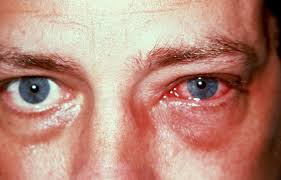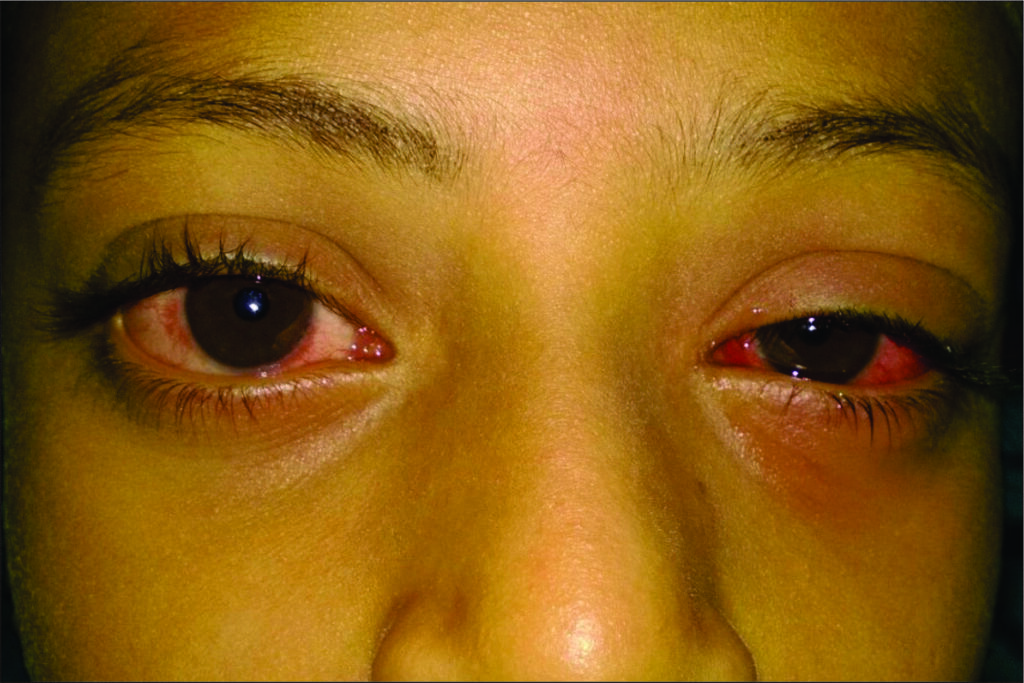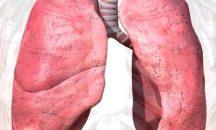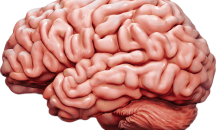Acute Hemorrhagic Conjunctivitis (Apollo/Pink Eye)

An appollo infected eye
We are seeing a number of people in some clinics with red eyes with discomfort and a sudden increase in num¬ber of people wearing protective glasses. This week I am excited to introduce Dr. Nana Kofi Osei who has been doing a terrific job of helping people manage these conditions as well as teaching groups of people how to reduce one’s risk or prevent infection.

….and he writes;
Acute hemorrhagic conjunc¬tivitis (AHC) is a severe form of viral pink eye that could cause eyelid swelling, eye discharge, and bleeding. There’s no cure, but treatments can help you man¬age the symptoms until the virus clears.
HOW IS IT TRANSMITTED?
Conjunctivitis is highly contagious.
AHC is usually transmitted through hand-to-eye contact, meaning you touch an infected surface or object and then touch your eye. You can also contract the infection by using an object that carries the virus on your eyes, such as a towel or makeup tool.
The infection can also be spread to others through close contact, such as a handshake, hug, or kiss. Coughing and sneez¬ing can also spread the infection.
You are at increased risk for pink eye if you wear contact lens¬es, especially if they are extend¬ed-wear lenses. That’s because bacteria can live and grow on the lenses.
Additionally, adenoviruses can spread through infected parti¬cles in the air that can land on or around your eyes.
WHAT ARE THE SYMPTOMS OF ACUTE HEMORRHAGIC CONJUNCTIVITIS?
Symptoms of AHC usually come on suddenly.
Common symptoms of AHC include:
• a feeling that something is in your eye
• watery eyes
• swollen eyelids
• fluid-filled, blister-like growths on top of the eye surface (che¬mosis)
• bleeding from blood vessels below the eye surface (sub conjunctival hemorrhage)
• blurring of vision or difficulty seeing
• sensitivity to light (photopho¬bia)
• fever
The earliest symptoms of AHC may be mild. But symptoms such as chemosis and hemorrhaging can become very painful and cause your eye to look bloodshot or com¬pletely red as blood leaks into the tissues under the eye’s surface.
HOW LONG DOES ACUTE HEMORRHAGIC CONJUNCTIVITIS LAST?
Most cases of AHC last five to seven days before symptoms start to go away.
However, the virus can still be contagious even after your symp¬toms subside.
WHAT IS THE TREATMENT FOR ACUTE HEMORRHAGIC CONJUNCTIVITIS?
There’s no cure for AHC, so most treatments aim to relieve the symptoms while the infection runs its course. Treatment options include:
• cold compresses to relieve pain and swelling
• eye drops to help lubricate the eye and promote tears that can help reduce the concentration of infectious material
• medications to reduce pain, such as ibuprofen
A doctor may warn against using any over-the-counter or prescription treatments, such as topical corticosteroids, that oth¬erwise might be used to treat pink eye. This is because steroids can cause super infections to develop on the eye’s surface, which need separate treatment with antibiot¬ics or antifungal medications.
HOW CAN I PREVENT ACUTE HEMORRHAGIC CONJUNCTIVITIS?
Here are some tips to help prevent yourself from getting AHC and spreading it to others if you have an active infection:
• Wash your hands regularly with soap and water for at least 20 seconds.
• Try not to touch or rub your eyes unless you’ve washed your hands.
• Don’t share towels, makeup tools, exercise equipment, or other commonly shared ob¬jects with someone who has an infection or if you have an infection.
• Throw away any mascara or eyeliner that may be contami¬nated.
• Avoid swimming in public pools or using shared hot tubs or steam rooms, where infectious particles can easily spread.
• Clean your glasses regularly to avoid transferring infectious material from your eyes to your glasses.
• Don’t wear contact lenses while you have an infection.
• Avoid reusing contact lenses. Consider switching to single-use lenses if you don’t already use them.
• Once your infection has gone away, wash all bedding that you came into contact with while you had the infection.
AHC is a form of viral conjunc¬tivitis that can cause more severe pain and redness than most oth¬er forms of pink eye. Symptoms come on quickly but typically go away on their own within a week.
Most cases of AHC go away without any treatment, but you should visit an eye doctor or pri¬mary care specialist if you have a fever or experience pain that disrupts your life.
Written / Compiled by;
Dr. Nana Kofi Osei
Health Essentials Limited
(BSC Biochemistry, MBChB, GMC certified)
AS ALWAYS LAUGH OFTEN, ENSURE HYGIENE, WALK AND PRAY EVERYDAY AND REMEMBER IT’S A PRICELESS GIFT TO KNOW YOUR NUMBERS (blood sugar, blood pressure, blood cholesterol, BMI)
Thought for the week – “If you plan to live to a ripe old age, make those golden years healthy ones and not bedridden years.”













